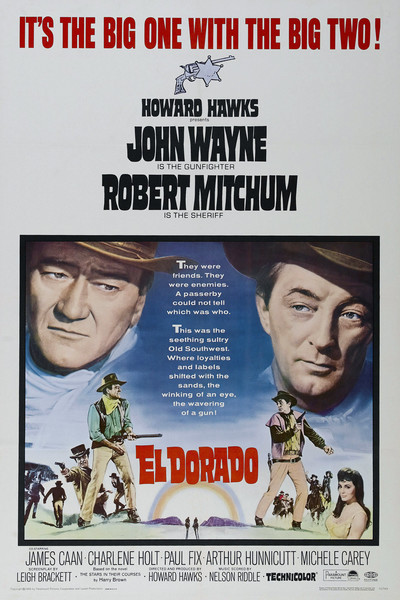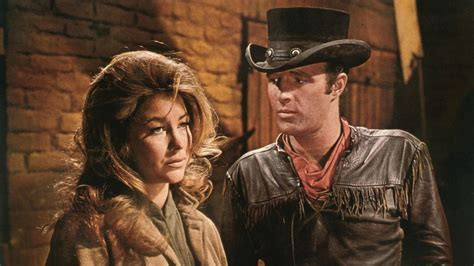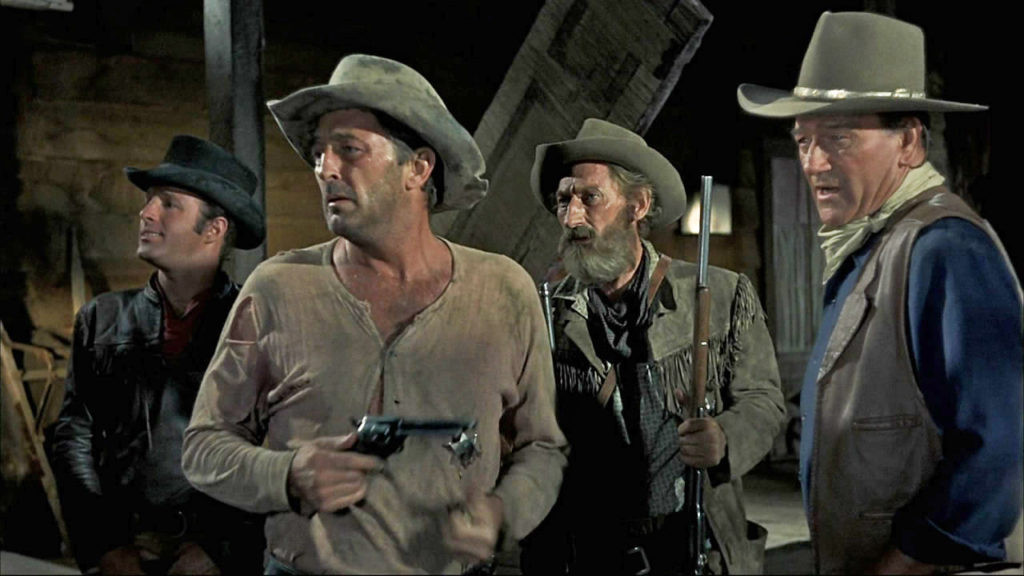For devotees of classic Westerns and the iconic John Wayne, El Dorado (1967) stands as a cinematic gem. Often mentioned alongside Rio Bravo (1959) and Rio Lobo (1970), this Howard Hawks-directed film offers a unique charm and enduring appeal that makes it a standout in Wayne’s extensive filmography. While some may point to The Man Who Shot Liberty Valance or True Grit when discussing Wayne’s best, El Dorado consistently captures the hearts of viewers, proving itself as a timeless favorite for those who appreciate the “Duke” in his prime.
 John Wayne and Robert Mitchum in El Dorado
John Wayne and Robert Mitchum in El Dorado
While the promotional poster of El Dorado might be considered dated by today’s standards, failing to fully capture the film’s essence, the movie itself is a masterclass in Western storytelling. Beneath a seemingly simple plot lies a rich tapestry of character development, witty dialogue, and exploration of enduring themes like friendship and loyalty. El Dorado transcends its genre, offering not just action, but a deeply human story that resonates with audiences across generations.
What sets El Dorado apart is its delightful blend of action and humor, anchored by stellar performances. John Wayne embodies the aging gunfighter Cole Thornton with a nuanced portrayal, showcasing both his legendary toughness and a world-weariness that adds depth to the character. He’s not just the typical stoic hero; Thornton is a man grappling with his past, his choices, and the changing landscape of the West. The film cleverly balances Wayne’s gravitas with moments of levity, particularly in his interactions with the supporting cast.
Robert Mitchum delivers a memorable performance as Sheriff J.P. Harrah, initially depicted as a capable lawman who has succumbed to alcoholism. Mitchum masterfully portrays Harrah’s descent and eventual redemption, adding a layer of pathos and complexity to the narrative. The dynamic between Wayne and Mitchum is a cornerstone of the film, their camaraderie and shared history providing both dramatic tension and comedic relief. Their scenes together are among the most captivating, showcasing the chemistry between two Hollywood giants.
 Michele Carey and James Caan in El Dorado
Michele Carey and James Caan in El Dorado
Adding youthful energy and brilliance to the ensemble is James Caan as Mississippi, a young, knife-throwing newcomer who quickly proves his worth alongside Thornton. Caan’s portrayal is nothing short of scene-stealing; his quirky mannerisms and memorable lines (“I have a host of friends!”) contribute significantly to the film’s charm. Mississippi isn’t just comic relief; he’s a capable and loyal companion who earns his place among the seasoned gunfighters. His presence injects a fresh dynamic into the classic Western formula.
Christopher George portrays the antagonist Nelse McLeod with chilling effectiveness. McLeod isn’t a one-dimensional villain; he’s a formidable gunfighter with a code of honor, adding a layer of moral ambiguity to the conflict. His “professional courtesy” shown to Thornton hints at a shared understanding and respect between adversaries, elevating the film beyond a simple good versus evil narrative.
The women of El Dorado also leave a lasting impression. Charlene Holt as Maudie, and especially Michele Carey as Josephine “Joey” McDonald, are more than just damsels in distress. Joey, in particular, is depicted as courageous and resourceful, actively participating in the fight to protect her family’s land. Carey’s performance brings a spirited defiance to the role, making Joey a memorable and integral part of the story.
Leigh Brackett’s screenplay is a standout element of El Dorado. Her writing is sharp, witty, and economical, providing the characters with dialogue that is both natural and engaging. The script excels in crafting memorable exchanges, particularly the banter between Wayne and Caan, Wayne and George, and the romantic sparks between Wayne and Holt, and Caan and Carey. The humor in El Dorado feels organic, arising from character interactions and situations rather than forced jokes, contributing to the film’s overall enjoyable tone. While Brackett also co-wrote Rio Bravo, El Dorado distinguishes itself with a more pronounced and effective use of humor.
The plot of El Dorado, while sharing thematic similarities with Rio Bravo, remains compelling in its own right. The story of the McDonald family being harassed by Bart Jason for their water rights sets the stage for classic Western conflict. Jason’s initial attempt to hire Thornton, and his subsequent recruitment of McLeod, drive the narrative forward with increasing tension. Sheriff Harrah’s personal struggles and eventual resurgence add another layer of drama, while the arrival of Thornton and Mississippi signals the impending showdown. The narrative builds steadily towards the inevitable confrontation, keeping viewers invested in the fate of the characters.
 Friends in El Dorado face tough odds
Friends in El Dorado face tough odds
At its core, El Dorado is a celebration of friendship. The film emphasizes the bonds between men, highlighting loyalty, camaraderie, and standing up for what’s right. Cole Thornton’s decision to side with Sheriff Harrah over a lucrative job offer underscores the value he places on friendship. The evolving relationship between Thornton and Mississippi, and Bull’s unwavering loyalty to Harrah and his friends, further amplify this central theme. El Dorado presents an idealized vision of male bonding, where friendship and moral conviction triumph over greed and power.
By 1967, John Wayne had entered a new phase of his career, often referred to as his “elderly period.” Yet, El Dorado showcases Wayne at his best, embodying a character who is both seasoned and still capable, both gruff and ultimately compassionate. He portrays Thornton as a leader who is willing to accept help, acknowledge his mistakes, and guide younger characters like Mississippi. This portrayal aligns with Wayne’s enduring screen persona as a man of integrity and moral authority. El Dorado captures Wayne in a role that resonates deeply with audiences, solidifying his legacy as a Western icon.
El Dorado was a commercial success upon its release, becoming one of the top-grossing films of 1967, and its reputation has only grown over time. Despite comparisons to Rio Bravo and Rio Lobo, El Dorado has carved out its own distinct place in cinematic history. Available across various formats, from DVD and Blu-ray to streaming services and television broadcasts, El Dorado remains easily accessible for modern audiences. Its consistently high IMDb rating and positive reviews are testaments to its enduring quality and entertainment value. For those seeking a classic Western that delivers action, humor, and heart, El Dorado is an impeccable choice. It’s a film that invites repeat viewings, offering a comforting and enjoyable escape into the world of the Old West, complete with memorable characters and a satisfying resolution.
If you appreciate El Dorado, you might also enjoy films like The Magnificent Seven, Hatari!, The Professionals, Silverado, Gunga Din, Butch Cassidy and the Sundance Kid, and, of course, Rio Bravo. These movies share similar themes of adventure, camaraderie, and the spirit of the West.

